The municipality of Porto reinforces its commitment to achieving carbon neutrality by 2030
Article

Last 5 June was World Environment Day. In this regard, the Municipality of Porto is reinforcing its commitment to the climate and environmental transition, adopting innovative and sustainable measures to achieve carbon neutrality by 2030, in line with the Porto Climate Pact.
With heavy investment in the creation and expansion of green infrastructure, modernisation of the municipal fleet and efficient use of natural resources, the city stands out as a national example of green urbanism and environmental resilience, and this week presented its Climate City Contract.
The implementation of advanced waste, water and energy management practices underlines the city's determination to promote a healthier and more sustainable urban environment for its citizens.
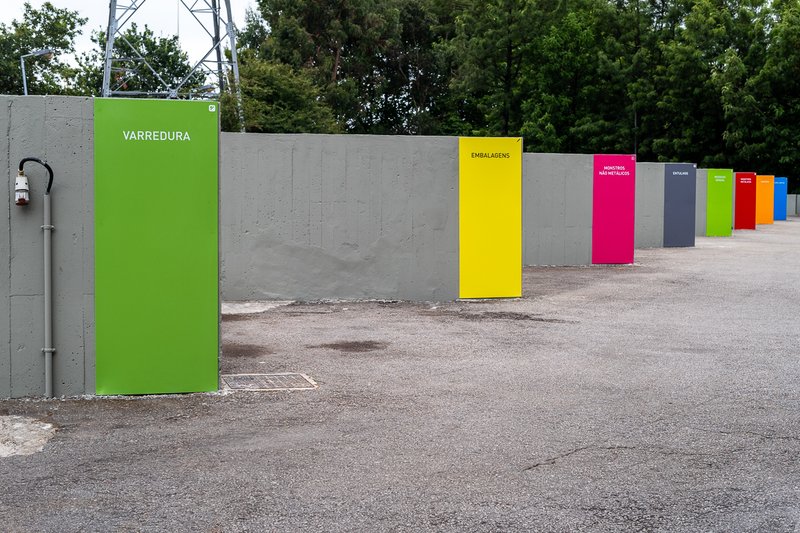
Porto's Environmental Sustainability in figures
Tonnes of waste recycled
20897 (2014) vs 37548 (2023) [+79.7%]
Rate of preparation for recycling
26% (2014) vs 43% (2023)
Number of Recycling Bins
944 (2013) vs 1300 (2023) [+37.7%]
Collection of Bio-waste from users
There was no residential organic waste system in 2013, only for catering and commercial spaces.
As of 2023, in compliance with the European standard, the city has two residential organic waste collection systems, door-to-door in some areas for all waste, and neighbourhood collection in collective containerisation areas.
Percentage of electric and hybrid vehicles in the fleet
0% (2013) vs 75% (2023)
Percentage of kilometres travelled by electric and hybrid vehicles
0% (2013) vs 65% (2023)
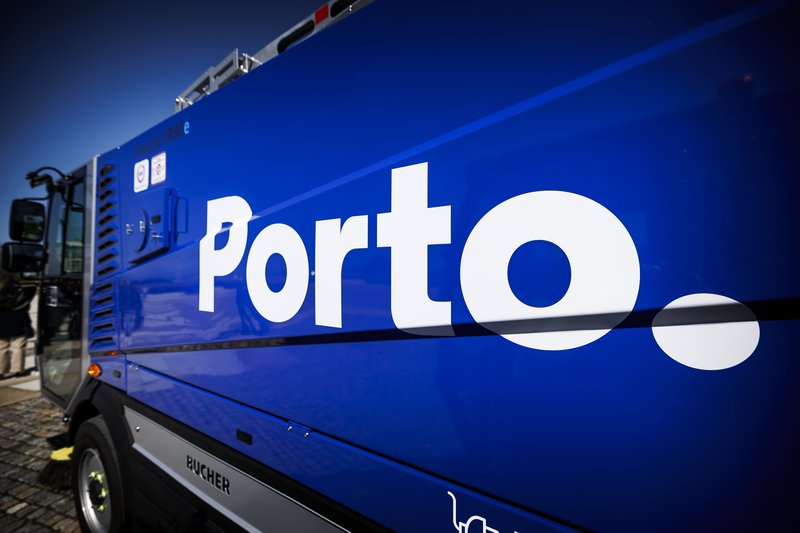
Waste Management
- 37,548 tonnes of waste recycled in 2023
- Rate of preparation for recycling of 43% in 2023
- 1,300 recycling bins throughout the city
Last year, the city achieved a record recycling rate of 43%, with Porto residents separating more and more. Thus, Porto has once again exceeded all recycling targets, with each Porto resident separating an average of around 78kg/inhabitant per year of packaging waste, compared to the target of 60kg/inhabitant per year. This achieved a rate of preparation for recycling of 43%, well above the 31% set as the national target.
In addition to raising awareness and preparation for recycling, another success factor is the significant increase in selective collection, with an extra 2,050 tonnes collected, an increase of 5.8% compared to the previous year.
In fact, with regard to the three waste streams, growth was 6.9%, with the highlight being the 7,210 tonnes of glass collected (4.6% more than the previous year), contrary to the national downward trend. The results for paper and packaging collection also increased, by around 7% and 10%, respectively.
This year, Porto Ambiente acquired 20 new machines, 12 of them electric (there aren't any more because there aren't enough electric sweepers of all sizes on the market). The 20 sweepers, already in full operation, guarantee greater efficiency for the teams of the municipal company, which already have more than three hundred workers, including cleaners and drivers.
The Organic project was launched in 2021, aiming to reduce food waste, which is now the most visible aspect of Porto Ambiente's bio-waste management. With the setting up of collection points and door-to-door visits in certain areas of the city, more than 2,500 tonnes of waste have been collected since the project began, involving more than 34,000 families.
With regard to environmental awareness, for the second year running, the waste collection project 'Não dês barraca, recicla' (Don't make a mess, recycle), promoted by the Porto Academic Federation (FAP), in partnership with Porto Ambiente and Lipor, at the Queima das Fitas in Porto, enabled 40 tonnes of waste to be recycled, recycling, as in 2023, around 70% of the waste produced at the Queimódromo.
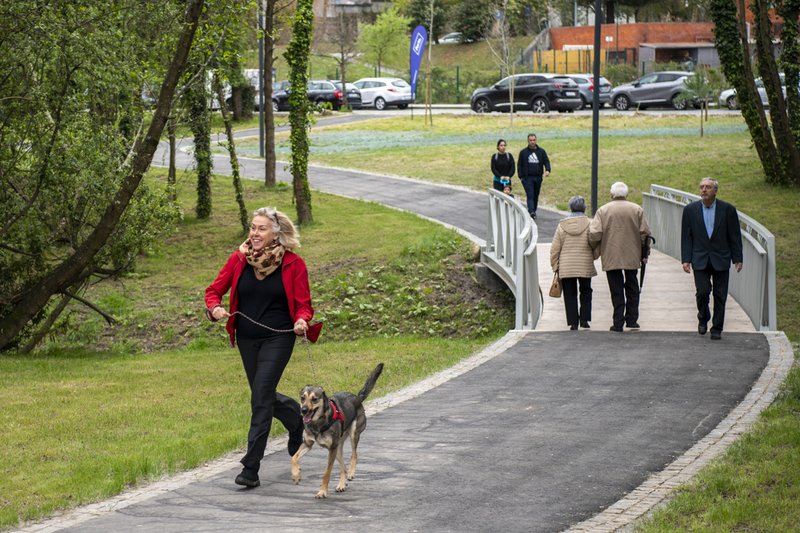
Green Area
- 3,484 trees planted in 2024
- More than 67,000 trees in the municipal grove
- An area of 77 hectares has been improved and expanded in the last 10 years
- 22 hectares of new green spaces in the last 10 years
- 30 hectares of new green spaces under construction or planned
The commitment to the expansion of the municipal grove, together with the work on dozens of hectares of green area, stand out in the redefinition of Porto's green landscape.
For example, the Asprela Central Park was opened to the city in 2022. There are more than six hectares of carefully designed landscape, with water mirrors, 900 planted trees, more than 700 preserved trees, streams and more than two kilometres of walking and cycling routes accessible to people with reduced mobility.
The investment, worth 1.9 million euros, has transformed the space into an example of flood mitigation, guaranteeing the protection of people, property and infrastructure, namely the Metro line.
The Municipality of Porto's environmental innovation can be seen in more than 130 green roofs and vertical gardens, which already cover an area of more than 11 hectares, and in the water retention basins created in the Asprela and Alameda de Cartes parks, which are essential for environmental prevention and rainwater management in urban centres.
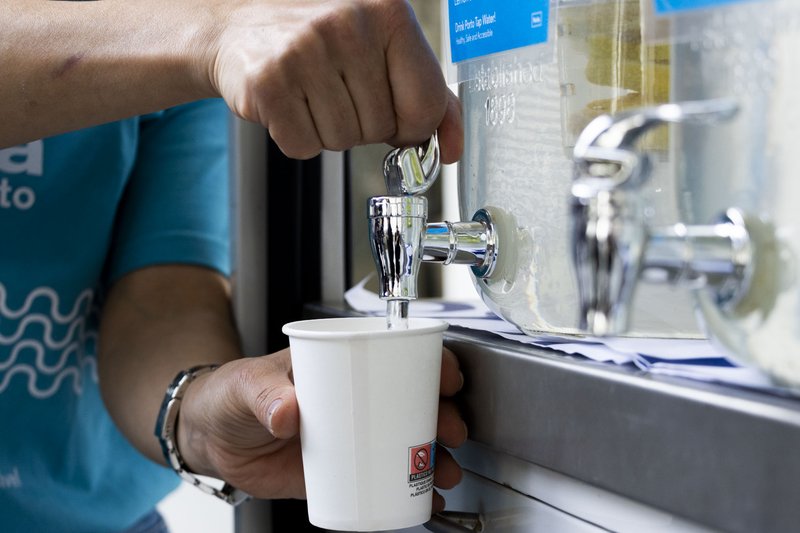
Water
- 13.28% unbilled water rate (less than half the national average of 27.1%)
- 1.2 million litres of water reused for street cleaning
Last year, Porto recorded an Unbilled Water Index of 13.28%, an all-time low, relevant in the fight against water waste. This contrasts with the national average, which is around 27.1% (more than double). Thus, the city ranks among the national organisations that waste the least drinking water.
This mark proves that the municipal company Águas e Energia do Porto is performing better at local and national level than in previous years, according to the Water and Waste Services Regulation Authority (ERSAR). In the words of the Deputy Mayor, Filipe Araújo, the ongoing effort to combat water waste in the public network results in 'proactive detection of anomalies in the network and the application of preventive measures that are crucial factors in managing and reducing the levels of unbilled water in a city as dynamic as Porto'.
In terms of saving drinking water, the city's streets are cleaned using reused water, which has already saved 1.2 million litres. The Water for Reuse (ApR) project is being developed by Águas e Energia do Porto with the support of the Portuguese Environment Agency, and results from an investment of around 750,000 euros.
This is the first project in northern Portugal to use reused water to clean public spaces and will produce 1,000 cubic metres of class A water every day, saving drinking water and reserving it for consumption. ‘Given the scarcity of this unique commodity, reusing water from a circular economy perspective should be seen as a requirement', says the Deputy Mayor of Porto.
Águas e Energia do Porto has joined the United Nations Global Compact Network Portugal and the more than 20,000 companies committed to the ten principles of the UN Global Compact. The aim is to promote sustainability by complying with fundamental rules in the fields of human rights, labour practices, environmental protection and anti-corruption.
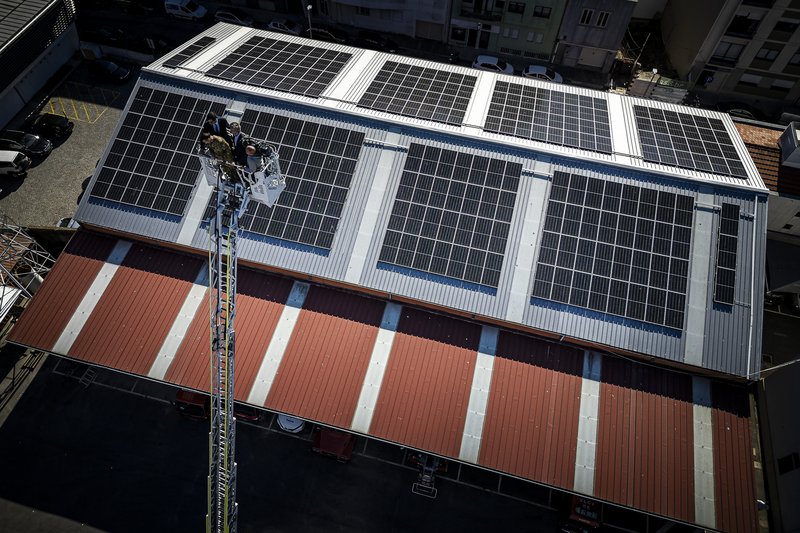
Energy
- 100% of street lighting to be LED
- 2.3 M€ less per year in electricity for public lighting (13M kWh)
- 100% of the electricity in the municipal universe comes from renewable sources
- 2,000 kW of installed power for renewable energy production for self-consumption in municipal buildings
With the completion of the installation of 30,000 LED lights throughout the city, an investment of seven million euros, the municipality will be able to save 2.3 million euros on electricity bills every year. Most of the nearly 23,000 bulbs were replaced during 2023, with the most recent changes visible around Campanhã railway station and on Rua da Constituição. Coverage using LED technology is thus close to 100%.
Of particular note is the Luís I Bridge, which was fitted with 66 LED lights, resulting in around 6,000 euros of annual savings on the city's energy bill.
As far as clean energy is concerned, the Porto Solar project so far represents an investment - entirely municipal - of 722,000 euros in 2,327 photovoltaic panels, installed on 29 buildings. With 5,000 square metres of panels installed as part of Porto Solar alone, Rui Moreira stresses the importance of, 'through public investment, being able to replace energy with clean energy that is produced by us'.
The project covers the headquarters of the Porto Fire Brigade, 24 schools and other facilities, such as the nursery and workshops in Carvalhido. On average, 30% of consumption in these buildings will come from renewable energy. In the Fire Brigade's headquarters alone, the municipality expects to save more than 20,000 euros a year.
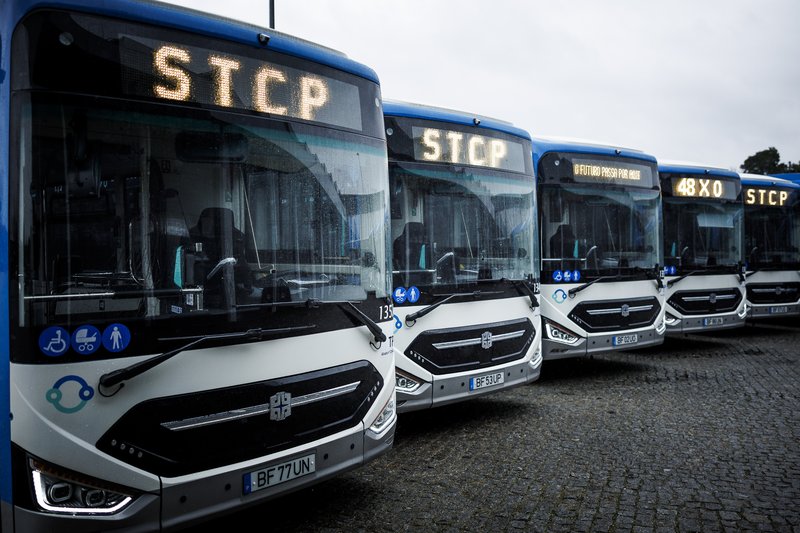
Mobility
- 75% of the municipal fleet consists of electric and hybrid vehicles
- 68 electric buses in the STCP fleet
The reduction in greenhouse gas emissions in Porto has already reached 52.2% in 2020 (compared to the base year of 2004), the result of a continued commitment to decarbonisation in various areas, namely in electricity production, as well as the implementation of measures in the area of mobility.
In addition to the municipal fleet, which is progressively made up of electric and hybrid vehicles, Sociedade de Transportes Colectivos do Porto (STCP) has also acquired 48 new 100% electric buses, which are already in circulation. The 'journey towards the future' was presented in February this year at the Via Norte Parking Station, with the presentation of the new fleet, which is scheduled to receive another 20 vehicles towards the end of this year.
By 2024, Sociedade de Transportes Colectivos do Porto (STCP) will see its 100% emission-free fleet increase from 20 vehicles to 96 (the 68 in circulation, 20 planned for the end of the year, and 8 midi-types), continuing the strategy adopted to decarbonise its commercial operation and, consequently, reduce its environmental footprint.
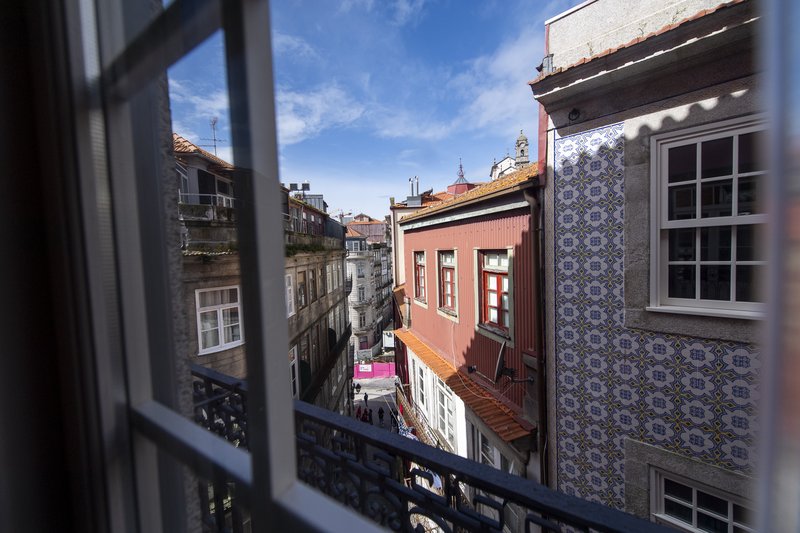
Housing
- Building rehabilitation and investment in energy efficiency
- 45% reduction in energy consumption in municipal housing buildings
- 150 M€ invested in seven years
The municipality has a housing stock of around 13,000 homes, where more than 28,000 citizens live. Only 25% of this population is active, which reinforces the vulnerability of this fringe, especially concerning the availability of and access to thermal comfort conditions in their homes.
Aware of this vulnerability, according to the Mayor of Porto, Rui Moreira, 'Porto has invested heavily in the refurbishment of these buildings', having already spent around 150 million euros over the last seven years, 'to implement energy efficiency measures, including the installation of photovoltaic solar panels in the common areas of the buildings, thermally insulated window frames and solar thermal panels for heating sanitary water'.
In all, in the municipality's housing stock, which represents 12% of the housing available in the city, the investment has meant a 45% reduction in the buildings' energy consumption.
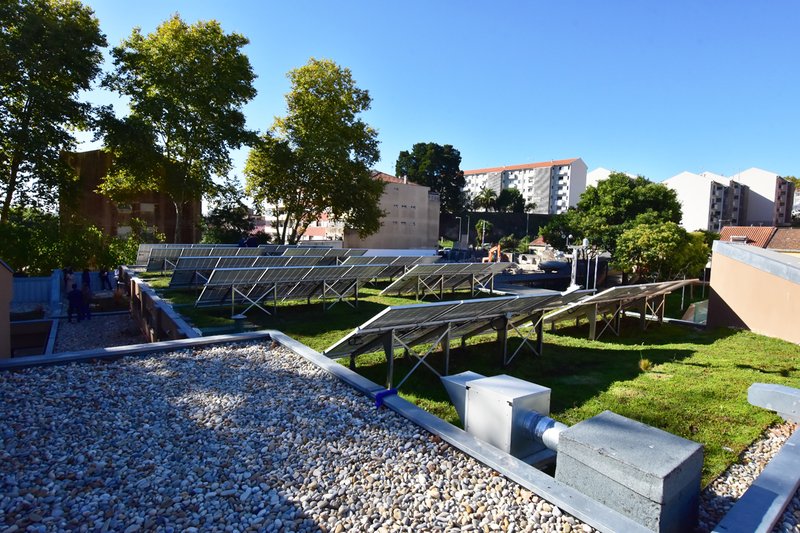
Society and Sustainability
Since 2019, students at Falcão Primary School have been able to say that their equipment is green. With nature-based solutions installed there as part of the European MyBuildingIsGreen project, the space has been setting an example with its 700 square metres of green roofs and façades, as well as photovoltaic panels.
The awareness programme to highlight is Eco-Ecolas (Eco-Schools), run by the Foundation for Environmental Education and implemented in Portugal by the Blue Flag Association for the Environment and Education (ABAAE), which aims to encourage action and recognise the work done by schools in the field of Environmental Education for Sustainability.
In Porto, there are already 42 Eco-Escolas, which receive more regular support from the Municipality in the activities promoted by the Integrated Education-Action Plan for Sustainability. The municipal plan's objectives include contributing to environmental literacy, the acquisition of new skills and know-how, as well as promoting learning with and in nature.
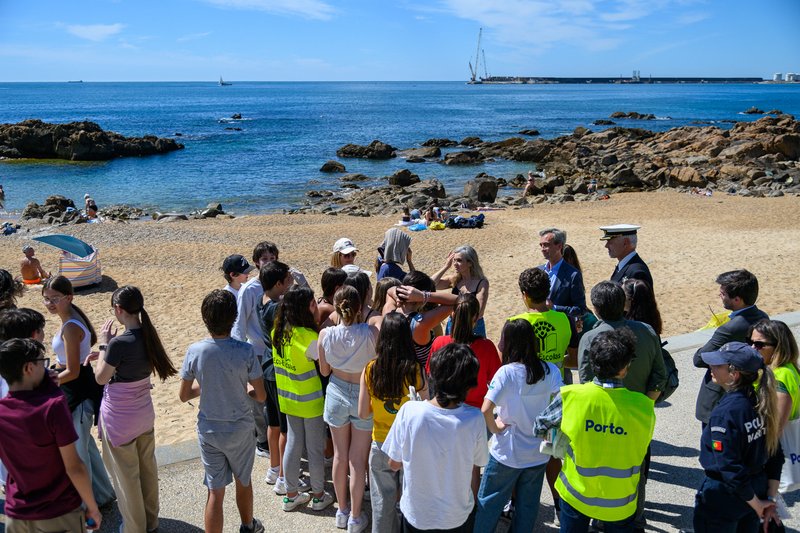
- 'Praia sem Plásticos' (Plastic-free Beach) leads 600 students to collect more than 145 kilos of waste
As part of the Integrated Education-Action Plan for Sustainability 2023/2024, 600 students from 13 schools in the Municipality of Porto took part in the action 'Praia sem Plásticos'.
Aimed at the school community, this initiative was designed to draw attention to marine pollution, mainly caused by plastics, and intended to involve the school community (with a focus on Eco-Escolas), from primary to higher education, in activities to collect, interpret, record and monitor waste on the city's beaches.
In just four hours, students and teachers, with the help of Porto's Education for Sustainability team, collected a total of 145kg of waste and 5,212 units of cigarette butts.
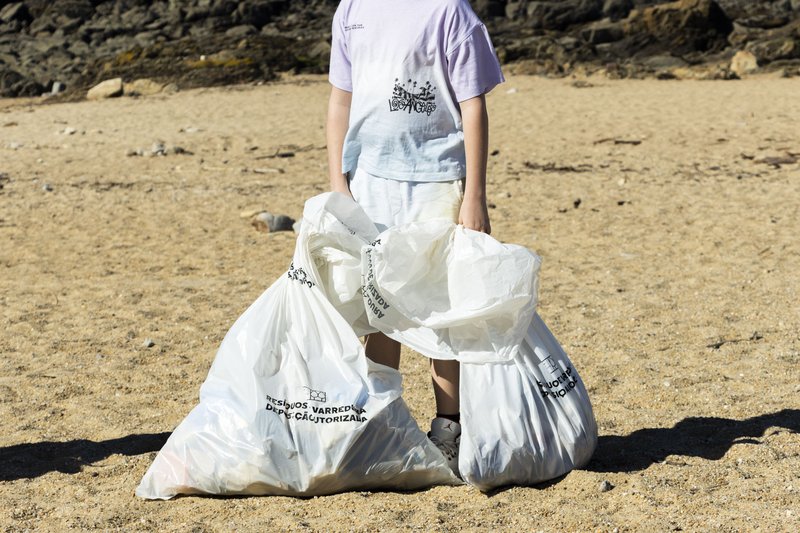
- Beach cleaning by students led to the collection of 25.6kg of waste from the beach
A group of 94 7th graders from the Lycée Français International du Porto (LFIP) took part in a clean-up of Homem do Leme beach, which resulted in the collection of 25.6 kilos of waste from the beach. The initiative was supported by technicians from the municipal company Porto Ambiente, who already carry out these periodic operations on Porto's beaches throughout the year.
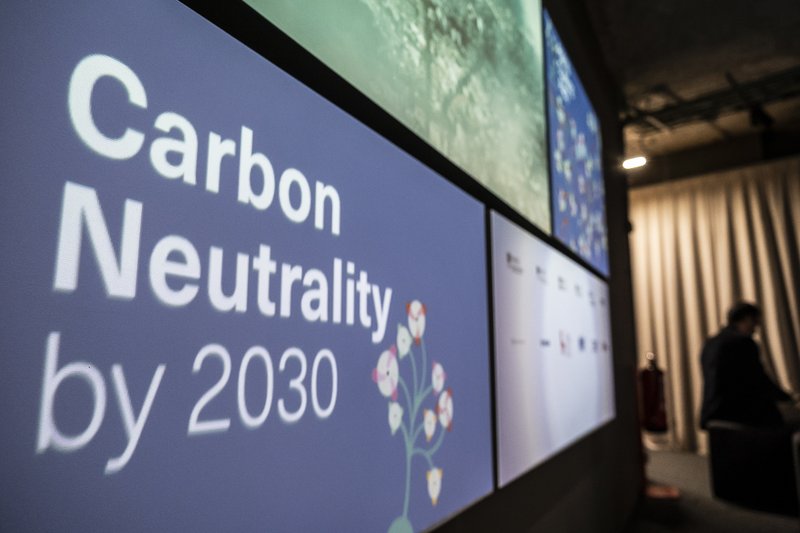
International Influence
At the end of 2023, and for the second time in a row, the city of Porto was selected by the European Commission (DG GROW and EISMEA) to play a leading role in the Intelligent Cities Challenge (ICC) 2.0, as part of a group of 10 mentor cities.
It will be up to this group to guide 64 other cities - the core cities - on a new two-year journey to create impactful strategies and develop innovative solutions that will put them at the forefront of the dual ecological and digital transition through Local Green Deals (LGD).
Last week, at the start of the second edition of the ICC, the ICC Strategy Lab conference was held in Brussels, in which Porto took part through Porto Digital and Porto Ambiente. In one of the good practice sharing sessions, the director for Carbon Neutrality, Daniel Freitas, presented the momentum that the city has built through the Porto Climate Pact, highlighting some sustainable examples of the city's built environment.